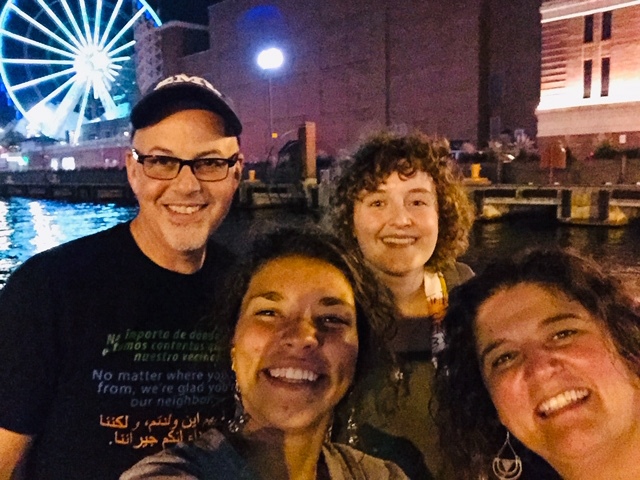Eastern Mennonite University’s Center for Interfaith Engagement (CIE) sent two students and two staff to the August 2019 Interfaith Leadership Institute in Chicago, Illinois.
The event is hosted by Interfaith Youth Core, an organization that CIE has collaborated with in the past and which organized a 2018 seminar that involved CIE director Tim Seidel, a professor at EMU who teaches undergraduate and graduate courses on politics, development, and peacebuilding.

The annual three-day conference is the “largest gathering of students and educators with a commitment to religious pluralism,” according to the website. “Participants learn to bridge divides and forge friendships across lines of religious and worldview differences” with the goal of bringing “the movement of interfaith cooperation back to their campuses and communities.”
Participants included junior Raviv Monahan and senior Ariel Barbosa; CIE Associate Director Trina Trotter Nussbaum, a graduate of the Center for Justice and Peacebuilding’s MA in conflict transformation program; and Campus Pastor Brian Martin Burkholder.
‘The most diverse space’
Both students have expressed interest in adding EMU’s new interfaith minor to their studies. Barbosa is an honors student double-majoring in sociology and Bible, religion and theology. Monahan is also an honors student with a double major in art and philosophy.
One attraction of the trip was an opportunity to have their perspectives challenged, said the students. Having been mostly in Christian-dominated spaces in the past, Barbosa said that the conference was potentially the most diverse space she’s ever been in.
“Despite being very connected to Jewish culture, I generally tend to think in very secular terms when it comes to politics and philosophy,” said Monahan, “so I thought the ILI would be an interesting change of framework: instead of secular, anti-religiosity as a unifier, understanding religious difference as one.”
Questions encouraged
Among many other activities, both students attended an introductory class of about 25 students from all faith backgrounds who explored their roots, discussed how to move from a polarized America to “a potluck America” and explored more about becoming an interfaith leader. Monahan particularly enjoyed the opportunity to interact in “one-on-one conversations with people of different faiths in an explicitly educational environment, where people were not afraid to ask questions.”
Another highlight was the “unconference,” in which attendees selected topics and led discussions on, among other topics, Israel/Palestine and economic inequality.
Monahan particularly valued connections with participants who talked about “the ways in which religion and culture can be incorporated into leftist work without resorting to wholesale rejection of religion, and how interfaith understanding and solidarity can strengthen the fight for socioeconomic and racial justice in our world.”
Crosscultural connection to Sikh temples visit
In one session about interfaith collaboration, Barbosa appreciated a story about a Canadian student of color who organized a homeless shelter in his city, connecting with Christian congregations and their churches that were unused at night and the Sikh community, which has a tradition of feeding large numbers of people.
During her cross-cultural semester in India, she remembered: “We were fed at the Sikh temples we visited, eating while sitting cross-legged amid the mass of temple visitors … Because of the Sikh value of service, known as seva, I was one of the 50,000 plus people fed the day we visited the Golden Temple in Amritsar. I remember feeling inspired.”
Join to encourage interfaith understanding at EMU
Such connections and learnings were among those the group discussed with Seidel back on campus as they consider how to share learnings in activities, events and discussion groups.
These conversations will also inform a project to encourage interfaith understanding and build community across differences on EMU’s campus. The project is a joint initiative of CIE and the Center for Justice and Peacebuilding project and is funded by IFYC.
Funding for attendance at the conference was provided in part by a grant from the U.S. Department of Education’s Undergraduate International Studies and Foreign Language Program. Portions of this grant aided in the development of EMU’s new global studies major.
Want to learn more?
For more information about getting involved on campus, connect with the Center for Interfaith Engagement. Leadership Institute participants Ariel Barbosa and Raviv Monahan also suggest visiting the IFYC website and also:
- Developing your religious literacy (to love our neighbor, we have to know our neighbor; take a quiz and test your knowledge);
- Thinking about pluralism, or the energetic engagement of religious diversity toward a positive end; and
- Practicing interfaith cooperation, which includes building mutually inspiring relationship while respecting different religious identities.
